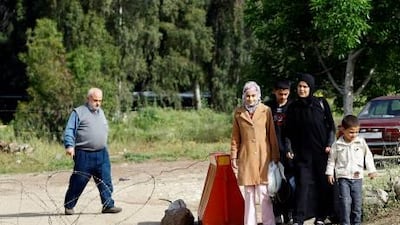WADI KHALED, LEBANON // The small group of refugees sat around a shisha pipe in the backyard of a house in north Lebanon looking out across the valley into Syrian territory where, last week, escalating violence forced them to flee their homes.
Looking weary and tense, they tell of bodies on the streets of the Syrian town of Tel Kalakh, where soldiers shot at homes with mounted machine guns.
"There were lots of us who came across," said a woman in her thirties, who declined to give her name because she feared for her safety.
She left her home in Tel Kalakh with her six children on Wednesday, joining hundreds of people who walked the few kilometres to the porous border and then waded across the shallow Nahr Al Kabir river into the northern Lebanese area of Wadi Khaled.
"It was really bad in our town. We didn't have any safety there," she said on Sunday.
Some refugees say there had been a military presence in the town for days but, on Wednesday, they said, the fighting became more intense. Electricity and water in the town was cut off.
People emboldened by the mass demonstrations in the region had been taking to the streets of Tel Kalakh, demanding change and calling for an end to what they described as the brutal rule of Syrian President Bashar al Assad.
Then, just as in Deraa, Baniyas, Homs and other parts of the country, came the crackdown. According to several who fled Tel Kalakh, security forces surrounded the town of 20,000 and launched an assault. Syrian human rights activists in hiding in Beirutsaid about 40 people were killed.
A man in his fifties, who escaped with his wife and children, claims soldiers fired into residential areas, hitting his house.
"It was from a gun [mounted] on a truck. I had to leave. There was no more chance to stay in Tel Kalakh. I never saw anything like this before in my life," he said. "People were dead in the street."
The mother of six said she was in her home when the sound of gunfire grew closer. "I was very scared," she said. "My children were outside, so I had to find them."
Since arriving in Wadi Khaled, she and her children have lived with about 60 Syrians in one house. She shows one of the rooms where stacks of mattresses are piled against the wall. Some residents opened their homes to the mostly women and children who arrived with little but the clothes on their backs.
She said she felt especially vulnerable, not only because she was left alone after her husband was jailed a year and a half ago, but also because they are Sunnis. She and others who have fled across the border, claim that Syrian troops and militiamen were targeting Sunni residents of Tel Kalakh, which also has an Alawi population, raising fears of a growing sectarian dimension to the crisis.
Mr Assad's family is part of the country's Alawi minority, an offshoot of Shia Islam.
The woman played a video on her mobile phone showing scores of men who she said were demonstrating in Tel Kalakh against the government. With raised fists, the men shouted "Salmiyah, salmiyah", "peacefully, peacefully". There is no way to verify the authenticity of the video.
A 12-year-old boy, who arrived with his parents and siblings, said he was terrified by the shooting. "We were scared to be in our houses. What if they shot through the windows and we die?" he said, mimicking being hit by a bullet and falling over on the floor.
Hundreds of Syrian refugees are said to be scattered around the Wadi Khaled area, but most are too afraid to identify themselves. One man, among the small group sitting around the shisha pipe, said around 3,000 had made the trip.
"They are all too afraid to talk," he said, as shots rang out across the valley. The group of Syrians flinched, but then laughed it off, dismissing the sound as celebratory gunfire for a wedding.
Mohammed Ahmed, the mukhtar, or community leader of Wadi Khaled, claimed that most of those who fled across the border last week have now returned to Syria.
"There was about 400 or 500 families, but now they are back in Tel Kalakh," he said. "Of course we said, Ahlan wa Sahlan [welcome]. We are neighbours."
For now, the mother of six and her family are staying put in Lebanon.
"We want to go back, of course," she said. "We'll see what happens [after planned demonstrations] on Friday."

